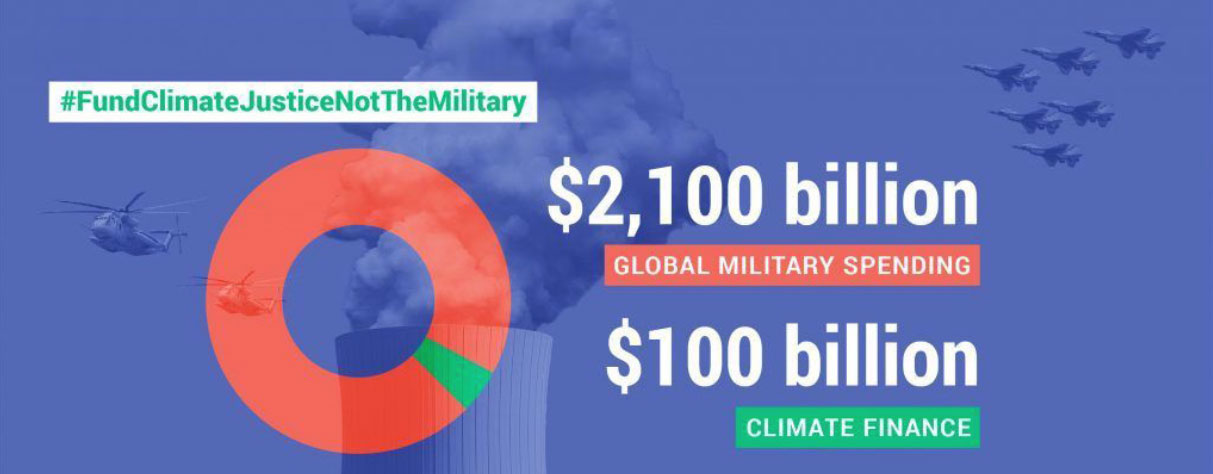Caption: The richest countries most responsible for the climate crisis – including Canada – are spending more on the military than on climate finance. A single year’s military spending by the top 10 military spenders would pay for promised international climate finance for 15 years (at $100 billion a year). #FUNDCLIMATEJUSTICENOTTHEMILITARY #WORLDBEYONDWAR
Image Credit: World Beyond War @worldbeyondwar
Around the world – from Ukraine to Palestine – war is devastating. Research in 2023 by the Institute for Economics and Peace indicates that over 238,000 people died in 32 conflicts around the world in the previous year. According to the UN, conflict and violence are currently on the rise globally, as humanity enters the era where conflicts are being exacerbated by the changing climate.
Approximately, 2 billion people live in conflict-affected areas like South Sudan, Syria, Yemen, and Afghanistan. Everyone suffers in times of war, but women and children suffer the most. In the past decade, up to 2 million of those killed in armed conflicts were children. The widespread trauma caused by violence and loss is the hurtful legacy of these conflicts, creating long term emotional and psychological stress.
War destroys communities and families through destruction and displacement. Economies collapse, food and water become scarce, and homes, schools, places of work, and sacred places that can take decades to build are destroyed in seconds. The environmental impacts of war include habitat degradation, carbon emissions, pollutants, and toxic contamination from weapons like depleted uranium and white phosphorus.
Together we must call on governmental and business leaders to advocate for peace in all conflict zones and invest in humanitarian efforts, including climate finance.
UN Climate Summit Highlights Need for Fossil Fuel Phaseout
Excepts edited from United Nations Secretary General Antonio Guterres opening remarks at the UN Climate Summit in the United Arab Emirates for COP 28.
“Earth’s vital signs are failing: record emissions, ferocious fires, deadly droughts and the hottest year ever. But it is not too late. We have the technologies to avoid the worst of climate chaos – if we act now. The UN’s Intergovernmental Panel on Climate Change has charted a clear path to a 1.5-degree world. But we need leadership – cooperation – and political will for action.
It’s true. Our world is unequal and divided. Developing countries are being devastated by disasters they did not cause. And climate chaos is fanning the flames of injustice. Global heating is busting budgets, ballooning food prices, upending energy markets, and feeding a cost-of-living crisis. But climate action can flip the switch.
Current policies would lead to an earth-scorching 3-degree temperature rise. The G20 – which represents 80% of the world’s emissions — must lead. We must accelerate a just, equitable transition to renewables. The science is clear: the 1.5-degree limit is only possible if we ultimately stop burning all fossil fuels. The economics are clear: the global shift to renewables is inevitable. The only question is how much heating our planet will endure before it happens. Humanity’s fate hangs in the balance.”
